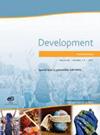IF 3.7
2区 生物学
Q1 DEVELOPMENTAL BIOLOGY
引用次数: 0
摘要
新陈代谢途径与表观基因组之间的相互作用对细胞的正常分化至关重要。在这项新研究中,Francisco Naya及其同事发现,Dlk1-Dio3非编码RNA(ncRNA)基因座通过协调肌肉细胞中的线粒体活性和组蛋白修饰来调节细胞状态。为了进一步了解这项工作背后的人物,我们采访了第一作者阿曼达-皮涅罗(Amanda Pinheiro)和通讯作者、美国波士顿大学生物学系副教授弗朗西斯科-纳亚(Francisco (Frank) Naya)。本文章由计算机程序翻译,如有差异,请以英文原文为准。
The people behind the papers - Amanda Pinheiro and Francisco Naya.
The interplay between metabolic pathways and the epigenome is essential for proper cell differentiation. In this new study, Francisco Naya and colleagues find that the Dlk1-Dio3 noncoding RNA (ncRNA) locus regulates cell state by coordinating mitochondrial activity and histone modifications in muscle cells. To find out more about the people behind the work, we caught up with first author Amanda Pinheiro and corresponding author Francisco (Frank) Naya, Associate Professor at the Department of Biology, Boston University, USA.
求助全文
通过发布文献求助,成功后即可免费获取论文全文。
去求助
来源期刊

Development
生物-发育生物学
CiteScore
6.70
自引率
4.30%
发文量
433
审稿时长
3 months
期刊介绍:
Development’s scope covers all aspects of plant and animal development, including stem cell biology and regeneration. The single most important criterion for acceptance in Development is scientific excellence. Research papers (articles and reports) should therefore pose and test a significant hypothesis or address a significant question, and should provide novel perspectives that advance our understanding of development. We also encourage submission of papers that use computational methods or mathematical models to obtain significant new insights into developmental biology topics. Manuscripts that are descriptive in nature will be considered only when they lay important groundwork for a field and/or provide novel resources for understanding developmental processes of broad interest to the community.
Development includes a Techniques and Resources section for the publication of new methods, datasets, and other types of resources. Papers describing new techniques should include a proof-of-principle demonstration that the technique is valuable to the developmental biology community; they need not include in-depth follow-up analysis. The technique must be described in sufficient detail to be easily replicated by other investigators. Development will also consider protocol-type papers of exceptional interest to the community. We welcome submission of Resource papers, for example those reporting new databases, systems-level datasets, or genetic resources of major value to the developmental biology community. For all papers, the data or resource described must be made available to the community with minimal restrictions upon publication.
To aid navigability, Development has dedicated sections of the journal to stem cells & regeneration and to human development. The criteria for acceptance into these sections is identical to those outlined above. Authors and editors are encouraged to nominate appropriate manuscripts for inclusion in one of these sections.
 求助内容:
求助内容: 应助结果提醒方式:
应助结果提醒方式:


